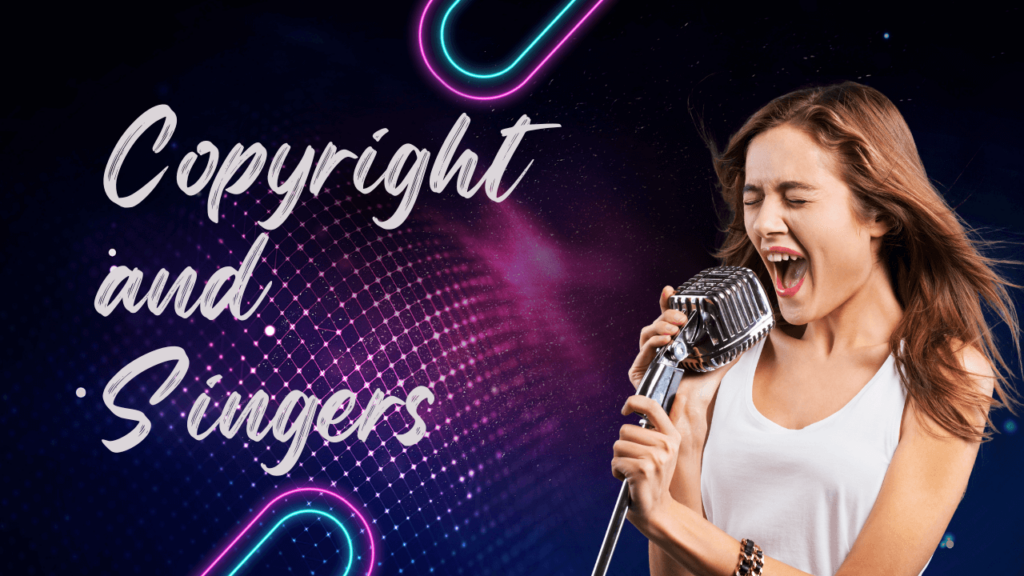
First Writer-
Mr. Mohammad Miqdad Shahid
B.A. Hons. (English), 4th Semester
(Roll Number: – 23/SMEH/BA(ENG)/028)
Department of English
School of Media Studies and Humanities
Manav Rachna International Institute of Research and Studies, Faridabad.
Second Writer-
Dr. Sujata
Professor
Department of English
School of Media Studies and Humanities
Manav Rachna International Institute of Research and Studies, Faridabad.
Copyright is an important feature of the music industry, especially it works to protect the self-esteem and dignity of the singers. It allows singers to protect their creative works and ensure that they receive both recognition and financial compensation for their efforts, and their work becomes patent.

This article explores the importance of copyright for singers, how it works, and the rights it helps provides to them. Copyright is a form of intellectual property that grants creators exclusive rights to their original works. In the context of music, these works can include songs, lyrics, melodies, and recordings. For singers, copyright is vital because it protects their vocal performances and ensures that others cannot use their work without permission.
The duration of copyright protection is different in different countries, but it generally lasts for the life of the creator plus an additional 50 to 70 years. In the case of sound recordings, the copyright term may be shorter, often lasting 50 to 70 years from the date of the recording.
When singers write their own songs, the copyright covers both the musical composition (melody, harmony, rhythm) and the lyrics. This protection ensures that no one else can legally reproduce, distribute, or perform the song without taking permission of the copyright holder. The actual recording of a song also enjoys copyright protection. This includes the singer’s vocal performance, the arrangement, and any instrumental accompaniment. The copyright on a sound recording is separate from the copyright on the musical composition, meaning that even if someone else owns the rights to the song’s composition, the singer (or their record label) may still hold the copyright to the recording.
Rights Granted through the Copyright Act
Access to Reproduction Rights: The copyright holder has the exclusive right to reproduce the work in any form, including digital, remix, revised, and physical formats. This means that no one can legally copy or distribute the work without permission.
Control over Distribution Rights: Singers have the right to control the distribution of their music. This includes selling CDs, digital downloads, or streaming the music online. Unauthorized distribution of their work through any medium is considered copyright infringement.
Permission for Public Performance Rights: When a song is performed in public, whether live or through a broadcast, the copyright holder is entitled to compensation. This is why venues and broadcasters typically pay licensing fees to performing rights organizations (PROs) like ASCAP, BMI, or SESAC in the United States.
Prohibit the Derivative Works: Copyright holders can authorize or prohibit the creation of derivative works, such as remixes, cover versions, or adaptations. This ensures that the original work is not altered or used in illegal means that the singer cannot approve of.
Own the Moral Rights: In some jurisdictions, singers also have moral rights, which protect their reputation and ensure that their work is not used in a way that could harm their image. This might include the right to be credited for their work or to object to modifications that could distort the original intent.
Copyright infringement occurs when someone uses a singer’s work without taking his permission. This can take many forms, such as unauthorized copying, distribution, public performance, selling CDs on shops or in hidden areas or the creation of derivative works. Singers can seek their rights through legal action, which may result in monetary damages and injunctions to stop the infringing activity.
Singers can also grant license their music to others, allowing them to use the work in exchange for royalties. This is a common practice in the music industry, with licenses being granted for use in films, commercials, video games, and more. Licensing ensures that singers continue to earn revenue from their work long after it has been released.
Copyright is essential for singers as it provides legal protection for their creative works and ensures that they are fairly compensated for their efforts. Understanding and managing copyright can help singers safeguard their careers and maintain control over their music. As the music industry continues to evolve with advent of new technologies and digital platforms, the importance of copyright remains indeed significant and imperative.